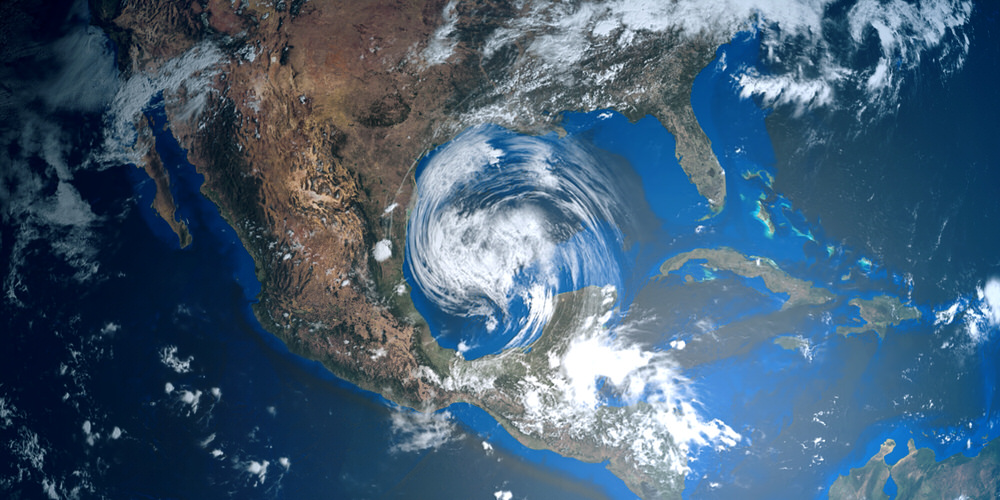Handling the Aftermath of Hurricane Harvey’s Gulf Coast Devastation

January, 2018
Natural disasters like hurricanes often hit so fast and with such a huge impact that the traumatic effects and lasting damage are beyond human comprehension. Since natural disasters are beyond man’s control, they often remind us of mankind’s limitations and of our greatest strengths when heroes and recovery strategies arise. During the aftermath, the shocking loss of lives, homes, communities and livelihoods is compounded by lasting effects on the economy within the geographic reach of the physical hurricane as well as within the reach of all affected industries. Unfortunately, a business doesn’t need to be located in the direct path of a hurricane to take a hit.
Forbes magazine recently called Hurricane Harvey “one of the worst natural disasters to strike the U.S. in recorded history.”1 The catastrophic effects to the areas and people affected were plainly evident to anyone who looked at any news media in recent months. The less broadcasted outcome is the approximately $190 Billion dollars in economic loss also reported by Forbes magazine.2
Part of this huge multi-billion dollar loss came from the severe hit to the Texas coastline, a significant energy hub of the US and the home of many of the largest refineries and petrochemical plants. The drastic impact of Harvey caused key chemical plants and businesses along Texas coast to completely shut to down. As a result, the region’s lost production continues to be felt nationwide.
“The U.S. Gulf Coast is home to about 90% of the nation's capacity to turn out base plastics, the building blocks for a wide range of consumer and industrial goods,” explained CNBC. CNBC also reported the supply channel for this huge plastic industry hub to be “paralyzed” in the aftermath of Harvey.3
According to Bloomberg Markets, Harvey disrupted more than one third of U.S chemical production. Bloomberg also reported that halted operations on the Gulf Coast boosted prices and threatened shortages for essential industrial resources like chlorine and ethylene. Consequently, manufacturing hikes were caused by higher raw material prices as well as supply shortages and shipping disruptions. These turbulences affected approximately 37% of U.S. capacity for producing chlorine and caustic soda, salt-derived chemicals used to make vinyl and PVC pipe, according to Bloomberg.4
Chemical production standstills affected the PVC manufacturing industry in more ways than one. The first effects were the higher commodity resin prices, but tight supplies in the post–hurricane market also caused price increases to take hold during the lengthy aftermath according to Plastic News.5 Additionally, the extreme, far-reaching flooding also affected the ability to fill and transport PVC product orders. The PVC pipe industry, for example, was filled with both chemical companies and manufacturers declaring force majeure sales limits, which put more pressure on companies that did not announce force majeure and tried to fill orders with existing supplies.
“The impact of force majeure on the PVC industry left many PVC pipe manufacturers with difficult choices about how to handle their customers and what to do with existing quotations,” explained Dave Merker, Vice President of Sales & Marketing for CANTEX Inc.
During aftermath of Harvey, CANTEX made the choice to honor all outstanding quotations, including price and terms of shipment, while other companies chose a different path. CANTEX has excellent relationships with our key resin supplier and although we did incur higher resin costs, we never encountered a PVC resin supply issue, according to Merker.
“Fortunately, the only effects Harvey had on CANTEX were shipping delays on PVC pipe and fittings after Harvey. We had to catch up with production because of our decision to honor all outstanding quotations and to try to help those who could not get PVC electrical products because of shortages. As a company, CANTEX always wants to remain loyal to the companies that partner with us even if we need to work harder to catch up later,” Merker explained.
With hundreds of thousands of people losing everything in Hurricane Harvey, CANTEX is very thankful for only minor interferences to our operations from Harvey. It is important to remember that this disaster has severely impacted so many lives. The heroes who stepped up to the plate during Harvey to save lives, serve as a great example that everyone can do something to help those affected by natural disasters. If everyone helps a little; little becomes much.
Foot Notes:
- Forbes.com
- Forbes.com
- CNBC.com
- Bloomberg Markets, August 28, 2017
- Plastics News, October 30, 2017